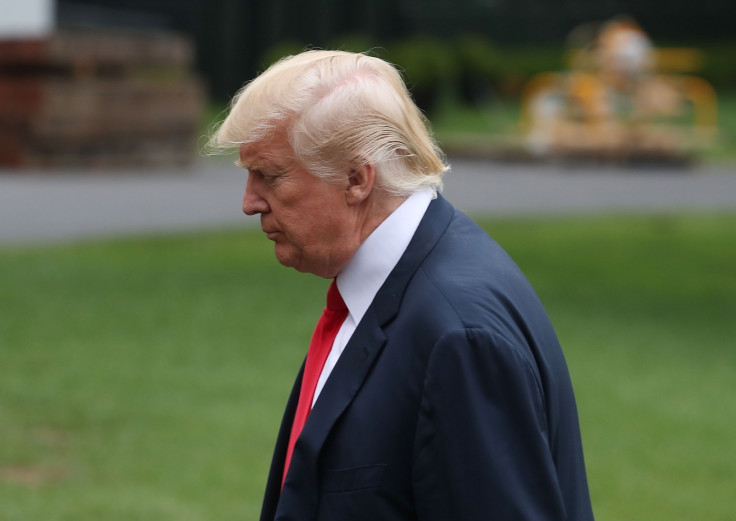Trump's official two-week vacation just ended - here's how badly it went
The two week break was meant to be a reset, it was the complete opposite.
Two weeks. A lot can happen in that time, but the recent arrival of General Kelly as the new chief of staff at the White House and Donald Trump's vacation was meant to be a chance to take stock, reset and put behind months of controversy.
An escalating series of investigations into possible Russian collusion, healthcare reform that had spectacularly collapsed, an ongoing row with his own Attorney General as well as the hiring and firings of Sean Spicer and Anthony Scaramucci. All was not sweet for the Trump administration.
But then came the two-week vacation. What followed was not what the White House or America had expected with the sudden threat of war with North Korea and the firestorm surrounding Charlottesville.
How those two weeks unfolded
On the 4 August, Trump arrived at his Bedminster golf club in New Jersey. Things had started out normally, with a series of tweets announcing that he would be "working hard".
On the 7 August, Vice President Mike Pence was forced to brush off rumours that he was planning to run against Trump in 2020. This angered the president, with the release of a tweet describing the New York Times as "totally inept."
On the 8 August, things took a sharp turn when the Washington Post reported that North Korea had worked out the technology to miniaturise a nuclear warhead which could be aimed at the US mainland.
This prompted one of Trump's strongest worded statements to date when he threatened the hermit nation with "fire and fury" if they engaged in any military action against the US.
To which, Pyongyang announced that they were drawing up plans to target Guam.
This all came amid news that Trump was considering military action in Venezuela to counter the increasing economic and political instability in the region.
The Pentagon said that they had "not received any orders with regards to Venezuela".
And this came at the same that that Trump's former campaign manager, Paul Manafort, had his home raided by the FBI has part of Robert Mueller's investigation into Russian meddling.
On Friday 11 August, a group of white supremacists marched through the University of Virginia campus in Charlottesville ahead of a rally the next day.
The events of the next 72 hours ended up becoming one of the defining moments of Trump's presidency so far.
The rally in Charlottesville began with white supremacists marching against the proposed removal of a Confederate statue. They were met with thousands as part of an opposition rally.
Violence spread and the flashpoint came when a neo-Nazi drove his car into a crowd of the counter protestors, dozens were injured and one woman was killed.
Trump quickly came under fire for now speaking up about the chaos in Virginia as even Melania Trump had issued a tweet condemning the violence.
He eventually made a statement from Bedminster saying: "We condemn in the strongest possible terms this egregious display of hatred, bigotry and violence on many sides — on many sides."
Trump's inability to denounce the white supremacists drew warning shots from both Democrats and Republicans, who urged him to call out those who were involved in the violence.
A whole 24 hours later he issued a new statement condemning the racism that had been on display, describing it as "evil".
But his delay in calling out the neo-Nazi elements in the rallies had been costly.
Several CEOs resigned from his various business councils over his handling of the violence. Trump shot back saying that he could find new captains of industry to replace them.
But another 24 hours later, Trump performed another U-turn.
"What about the alt-left that came charging at the, as you say, the alt-right?" Trump said. "Do they have any semblance of guilt? What about the fact they came charging with clubs in their hands, swinging clubs? Do they have any problem? I think they do. As far as I am concerned, that was a horrible, horrible day."
The comments left politicians on both sides of the aisle stunned.
But the chaos wasn't over yet.
The North Korean threat subsided with Pyongyang announcing that they had backed down from their plans to strike Guam. This should have been a victory for Trump, but that was lost amid his ongoing domestic issues.
More members of his manufacturing council resigned and, eventually, Trump decided to disband the council all together.
The fallout from Charlottesville continued, as Trump's entire presidential arts and humanities commission quit.
Then Trump's top aide, Steve Bannon left the administration, a move that had been expected for some time.
It was announced on Saturday the 19 August that Donald and Melania Trump wouldn't be attending this year's Kennedy Center honours to avoid "political disruption," but breaking years of tradition.
And 24 hours later, Trump arrived back in Washington. His two-week vacation was anything but.

© Copyright IBTimes 2025. All rights reserved.






















